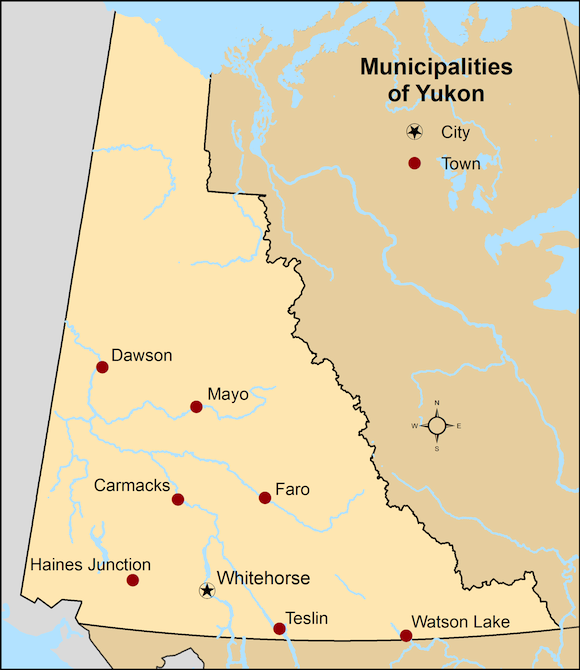The Gold Report: The Yukon is ranked first in mineral potential and ninth overall in the recent ranking of global mining jurisdictions in the Fraser Institute's 2015 Annual Survey of Mining Companies. Is that good enough? What are some of your mining-related goals for the Yukon?
Darrell Pasloski: You can't get better than number one when it comes to mineral potential but the ninth overall ranking to me says that there's still some work to be done. Our mineral endowment certainly is world class and the opportunities as a world-class jurisdiction for mining exploration and development will make us a future leader in the mining sector. There are more than 2,700 existing mineral occurrences in Yukon but these cover only about 12% of the land, so that leaves vast potential for current and future explorers.
The first goal would be more streamlined permitting. The federal government currently holds our environmental assessment legislation and is making amendments to the Yukon Environmental and Socio-economic Assessment Act. Those amendments will ensure that our assessment process is consistent with those in other jurisdictions, which should allow us to remain competitive. Here in Yukon, we're working on the Mine Licensing Improvement Initiative. Improvement to this process will foster a more predictable and efficient regulatory environment.
"Alexco Resource Corp. continues do to reclamation, as well as mining and exploration work."
The second goal would be improved infrastructure. There has been more than 100 years of mining in the territory and some good foundational infrastructure has supported the sector for decades. Yukon already has about 5,000 kilometers of government-maintained roads, an international airport, many community airports, and access to two ice-free deepwater ports that are probably a couple of days sailing closer to market than other ports along the northwest coast. Last year we made significant capital investments in highway, bridge and airport upgrades. This year our capital budget marked another record capital investment in infrastructure. And we have begun to plan for development of new hydroelectric infrastructure that will provide enough energy capacity to take us well into the future. In fact, almost all of the electricity for communities now is from renewable energy sources.
TGR: Where does mining rank in terms of economic impact in Yukon?
DP: Historically, mining has accounted for about 20% of Yukon's GDP. Mining is the cornerstone of the Yukon economy. Things are great when the resource industry is strong, but we also feel the effects when the industry goes through cyclical downturns.
TGR: Much of the Yukon is occupied by First Nations. How is the Yukon government helping mining companies and First Nations build trust and relationships?
DP: The mining industry is the largest employer of First Nations people in Yukon. We have 14 First Nations in Yukon and almost half of the modern day land claims in Canada are here. Eleven First Nations already have land-claim and self-government agreements. Each of the First Nations that has land claims also has an economic development corporation. There's a tangible business-ready approach to identifying opportunities.
One of the realities, though, is that because we've been modern treaty trailblazers we are also among the first to encounter the challenges of such uncharted territory. Our relationship with First Nations people is strong, but it's not always easy. Meanwhile, mining companies operating here have been progressive in developing First Nations relationships on their exploration and development projects. Each company has some type of cooperation agreement in place with affected First Nations. First Nation communities and businesses both benefit from these agreements and the opportunities that come from them.
"Victoria Gold Corp. has one of the most advanced projects in Yukon."
We also work with the Yukon First Nation Chamber of Commerce and Yukon First Nation Development Corporations. For example, we signed an agreement not long ago with Kluane First Nation to collect some geophysical data via airborne survey on a portion of the Kluane Ranges, part of its traditional territory. That area hosts Wellgreen Platinum Ltd.'s (WG:TSX; WGPLF:OTCPK) Wellgreen project. The results from such a survey will help the Kluane First Nation identify possible economic opportunities on its settlement land and assist with resource management. There's a lot of work being done on the ground to assist First Nations.
TGR: Please give us three reasons why mining companies should spend their limited exploration budgets in your territory versus perhaps Alaska or British Columbia?
DP: First, you mentioned earlier that the Fraser Institute identified Yukon as having the world's greatest geological potential. There is a remarkable endowment of significant gold, silver, lead, zinc, copper, nickel, iron, molybdenum, tungsten, and platinum group metals (PGMs) deposits. More than 2,700 mineral occurrences have been identified in roughly 12% of the landmass—Yukon is significantly underexplored. We have a long history of discoveries that continues to multiply with each exploration boom. As a result of the recent two-year exploration boom that started in 2010, more than 7.3 million ounces (7.3 Moz) gold in new discoveries were added to the previously existing deposits that totaled 23 Moz gold, 50 Moz silver and 10 Moz PGMs. That's significant.
Second, Yukon has an experienced and supportive service-supply sector. The knowledge is here whether it's assay labs, airborne electromagnetic surveys, helicopters or drillers. The businesses that are required to support the mining industry are well established in Yukon and are here to make life easier for exploration companies.
Third, this is a very mining friendly jurisdiction. Our government recognizes that the mining industry is a cornerstone of our economy. We realize that the benefits accrue directly to Yukoners and Yukon businesses, as well as to mining companies and their investors. Our government will continue to work on its mineral development strategy. Our goal is to rank first in all of the categories in the Fraser Institute survey.
TGR: Some mining pundits believe that recent environmental legislation put in place by Canada's federal government makes it unusually difficult to permit a mine or develop new deposits on an already permitted property. What's your view?
DP: More than a decade ago the federal government transferred management of the territory's land, water and resources to the territorial government. Along with that was the creation of the Yukon Environmental and Socio-economic Assessment Act here in the territory. We have our own made–in–Yukon approach to environmental assessments. Those assessments also have to factor in the social and economic benefits of each project. In the past eight years, seven mining permits have been issued within 18–30 months, which is either comparable or better than most First World jurisdictions. Investors also benefit from being in one of the most geopolitically safe mining jurisdictions in the world, with security of tenure that is second to none. Once a permit is granted, a company and its investors can move forward with little risk that the permit will be revoked. We in Yukon have grown our mineral sector over the past decade and we want to stay at the forefront of investment attraction.
TGR: Tell us briefly about the Yukon Mining Alliance.
DP: It's actually quite exciting. The Yukon Mining Alliance (YMA) is composed of Yukon's leading exploration and development companies, and those firms are focused on creating innovative capital attraction initiatives to promote Yukon as a top mineral investment jurisdiction, while at the same time promoting their companies and projects. The YMA initiatives include such things as going to international conferences and events with a mining investment focus. Senior Yukon government officials support these activities by going along and communicating to investors some of Yukon's key advantages. For instance, in September 2014 I went to the Denver Gold Forum with the Mining Alliance. A lot of companies are envious of the relationship that exists between the Yukon government and the mining industry here. It's a unique relationship. Not only are these company CEOs promoting their product, but essentially they're promoting Yukon as well.
TGR: That's rare in Canada. What are some companies that are demonstrating success in the territory?
DP: That's also pretty exciting. Victoria Gold Corp. (VIT:TSX.V) has certainly one of the most advanced projects in Yukon as it's already permitted for construction and hosts an NI 43-101-compliant reserve of about 2.3 Moz gold. Once it reaches production it will produce more than 200,000 ounces annually. The company continues to explore and add value. Victoria completed an exploration program on the Olive zone, part of the Dublin Gulch property, in 2014, and initial results demonstrate that it is a high-grade deposit that could be amenable to heap leaching, which increases the value proposition for Victoria and its shareholders.
"Wellgreen Platinum Ltd.'s project has the potential to become one of the world's largest, low-cost producers of PGMs and nickel from an open pit."
There's been a lot of talk about Wellgreen Platinum. This project has the potential to become one of the world's largest, low-cost producers of PGMs and nickel from an open pit. It's accessible from the Alaska Highway. A recently released preliminary economic assessment (PEA) shows that its resource has increased fivefold in less than three years.
Another one is Kaminak Gold Corp. (KAM:TSX.V). Kaminak owns 100% of Coffee, a high-grade oxide gold project that is amenable to heap leaching. The company recently started a feasibility study following a robust PEA released last year.
Western Copper and Gold Corp. (WRN:TSX; WRN:NYSE.MKT) operates here in Yukon and owns 100% of Casino, a large gold-copper project that is in the permitting phase. Should it go ahead, it would be a significant contributor to Yukon's economy. The initial capital requirement is about $2.5 billion.
Another one is Capstone Mining Corp. (CS:TSX), which has existed for a number of years. The company is currently completing the work necessary to obtain its water license to begin stripping its newest open pit. Capstone is a real success story. One of the unique aspects of the Capstone project is that it's situated on land owned by the Selkirk First Nation. And because it's on First Nation land, 100% of the royalties accrue to the First Nation development corporation and the Selkirk First Nation citizens. That's a good example of how there can be a substantial direct benefit to First Nations as a result of the mining industry. Those are some companies that are quite exciting and that have projects that are moving along.
TGR: What are some companies that are at the early stages of exploration?
DP: Rockhaven Resources Ltd. (RK:TSX.V) is exploring its 100%-owned Klaza property, a high-grade, bulk-tonnage gold-silver prospect near Mount Nansen in southwestern Yukon. The company recently completed just under 20,000 meters of diamond drilling targeting high-grade gold and silver mineralization.
Another one I would like to mention is Alexco Resource Corp. (AXU:NYSE.MKT; AXR:TSX). It owns the Keno Hill silver district and operated the Bellekeno mine there between 2011 and 2013, which was Canada's only operating primary silver mine before low silver prices forced the company to suspend operations. However, Alexco has entered the permitting process to expand its opportunity for mining in that camp. The Keno Hill district hosts some significant past-producing silver mines.
TGR: Alexco is also cleaning up some of the leftover effects of those old mines.
DP: Yes. It is a unique situation. Alexco has a contract with the federal government for reclamation work on several past-producing properties. The company continues do to reclamation as well as mining and exploration work. That's very exciting. We have a couple of other Type 2 sites in Yukon that were permitted prior to when Canada passed the responsibility for management over to the Yukon government. Those sites are being reclaimed as we speak.
TGR: What's one message that you want to get out to mining investors and the public about Yukon?
DP: Most people recognize Yukon for the incredible beauty of its vast mountain ranges, Boreal forest, and spectacular lakes and rivers, but Yukon is equally beautiful below the ground. When it comes to mining, our potential is second to none. I'm excited about the opportunities out there for the mining industry. The growth and development of that industry will help bring prosperity to Yukon citizens and their communities, as well as to mining companies and their investors. By continuing to invest strategically in infrastructure and ensuring that our permitting and assessment processes are as efficient as possible, we will help position Yukon to be the best place in the world for mining.
TGR: Thank you for taking some time to talk with The Gold Report. It is much appreciated.
First elected as leader of the Yukon party on May 28, 2011, Darrell Pasloski was sworn in as Premier on June 11, 2011. He was elected to the Yukon Legislative Assembly in October of 2011 in Whitehorse’s electoral district of Mountainview. In addition to his duties as Premier, he also serves as Minister responsible for the Executive Council Office and as Minister of Finance. Prior to entering politics, Premier Pasloski worked as a pharmacist and business owner, was an active member of Yukon’s business community and had a long record of volunteer service.
Read what other experts are saying about:
Want to read more Gold Report interviews like this? Sign up for our free e-newsletter, and you'll learn when new articles have been published. To see a list of recent interviews with industry analysts and commentators, visit our Streetwise Interviews page.
DISCLOSURE:
1) Brian Sylvester conducted this interview for Streetwise Reports LLC, publisher of The Gold Report, The Energy Report and The Life Sciences Report, and provides services to Streetwise Reports as an independent contractor. He owns, or his family owns, shares of the following companies mentioned in this interview: None.
2) The following companies mentioned in the interview are sponsors of Streetwise Reports: Alexco Resource Corp. Victoria Gold Corp. and Wellgreen Platinum Ltd. The companies mentioned in this interview were not involved in any aspect of the interview preparation or post-interview editing so the expert could speak independently about the sector. Streetwise Reports does not accept stock in exchange for its services.
3) Darrell Pasloski: I own, or my family owns, shares of the following companies mentioned in this interview: None. I personally am, or my family is, paid by the following companies mentioned in this interview: None. My company has a financial relationship with the following companies mentioned in this interview: None. I was not paid by Streetwise Reports for participating in this interview. Comments and opinions expressed are my own comments and opinions. I determined and had final say over which companies would be included in the interview based on my research, understanding of the sector and interview theme. I had the opportunity to review the interview for accuracy as of the date of the interview and am responsible for the content of the interview.
4) Interviews are edited for clarity. Streetwise Reports does not make editorial comments or change experts' statements without their consent.
5) The interview does not constitute investment advice. Each reader is encouraged to consult with his or her individual financial professional and any action a reader takes as a result of information presented here is his or her own responsibility. By opening this page, each reader accepts and agrees to Streetwise Reports' terms of use and full legal disclaimer.
6) From time to time, Streetwise Reports LLC and its directors, officers, employees or members of their families, as well as persons interviewed for articles and interviews on the site, may have a long or short position in securities mentioned. Directors, officers, employees or members of their families are prohibited from making purchases and/or sales of those securities in the open market or otherwise during the up-to-four-week interval from the time of the interview until after it publishes.





























































